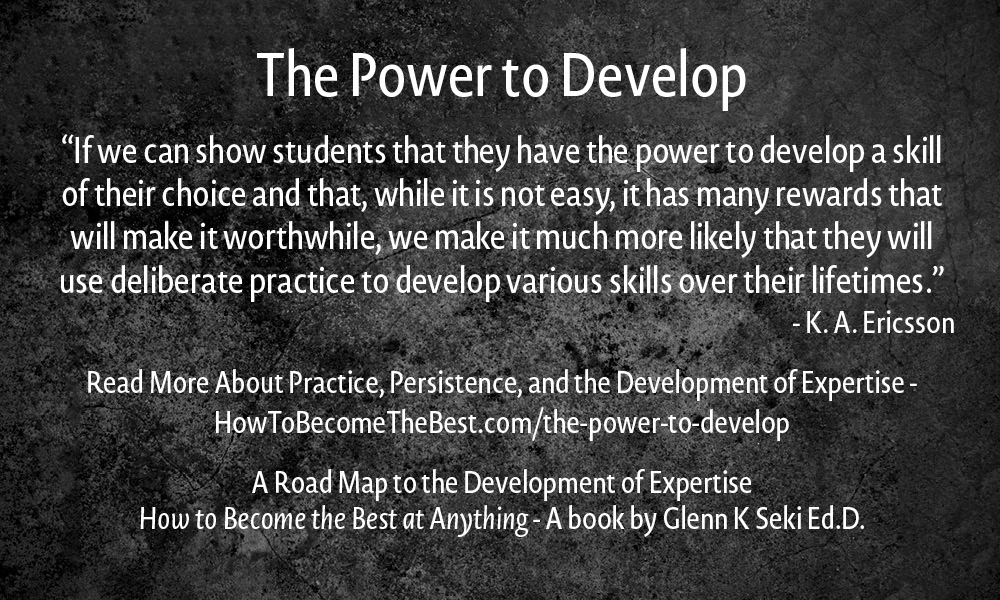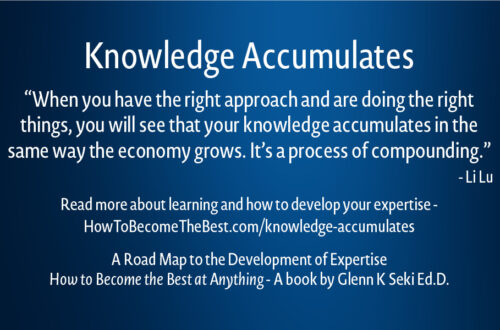“If we can show students that they have the power to develop a skill of their choice and that, while it is not easy, it has many rewards that will make it worthwhile, we make it much more likely that they will use deliberate practice to develop various skills over their lifetimes.” – K. A. Ericsson
About Practice, Persistence, and the Development of Expertise
An excerpt from How To Become The Best at Anything, Chapter 8, Deliberate Practice and Learning
“To become the best takes practice, lots and lots of practice. I have mentioned the 10,000-hour rule. It takes about 10,000 hours of practice to get really good at something and not just any type of practice, but deliberate practice. Deliberate practice is practicing to get better.
The classic example is a man who has gone golfing almost every weekend for the past twenty years. He has a great interest in the sport and has fun with it. He reaches a certain level of expertise and plateaus there after about seven years. He is good enough to win occasionally playing, against his friends. He has fun, although after twenty years of practice why hasn’t he become a great golfer? Because he was not practicing to get better, he was not using deliberate practice, he was just participating in the sport. When you practice, you need to be practicing something that will help you become better.
10,000 hours of practice comes out to about 5 to 6 hours a day, 4 to 6 days a week, for 7 to 10 years of deliberate practice. That’s what it takes to become one of the best, depending on the domain. This is a lot of deliberate practice!
What if you want to become the best in a domain that is a new sport or profession? If levels of expertise have not been fully established, then you can become the best in far fewer hours of deliberate practice. This is because no one has practiced and established themselves in the domain yet. The bar of expertise is being reset all the time. As time goes by, the 10,000 hours will be reached, and fully automated sequences will be in place making it harder for novices to attain high levels of expertise. Those that started first in the new sport or profession, as long as they continue to improve, will remain on top.”
Automaticity
“Deliberate practice results in the automation of a sequence of steps. It is automated so you don’t have to consciously think about it while you are doing it, you just do it. Some people call this “muscle memory.” I don’t like this term since muscles have no memory. Repeat after me, “muscles have no memory.” This automated sequence of steps is in your memory, in your brain. Your brain places this automated sequence of steps into nice and neat “chunks,” so you do not have to consciously think about them.
Remember when you were first learning to drive a car. It was very difficult and stressful because you had to remember to do so many new things at the same time. Most DMVs require a minimum of 50 hours supervised behind-the-wheel experience before you may apply for a license if you are under 18. It takes 100 hours of deliberate practice before a complex sequence begins to fully automate. That is why it is so difficult in the beginning to drive a car in traffic.
Now that you have been driving for several years, when you are commuting home after work, you probably don’t think about driving, you suddenly find yourself at the freeway off-ramp and almost home. That is because your diving has become automated, if something unusual occurs, you instantly snap back into conscious thinking mode and make corrections to your driving.
This is also why you must practice good driving habits in the beginning, so you don’t automate a bad habit. Once a bad habit is automated, it is very hard to un-automate it and replace it with the correct automation. Learn the basics correctly the first time. This goes for all practice, for all domains.”
Persistence and Motivation
An excerpt from How To Become The Best at Anything, Chapter 9, Persistence, Motivation, and More About Your Path
“Keep practicing no matter what. It will take years, you know this, so you have to keep practicing. You have to keep practicing getting better every time you practice. This is a very hard thing to do. You will get tired, bored, and frustrated. It is hard to keep your focus while practicing.
I heard a story about John Wooden (often considered one of the greatest college basketball coaches, ever) while I was a student at UCLA. During practice one of the basketball players was not practicing very hard. John Wooden pulled him aside and asked the player what was wrong. He was only working at 70%. He told his coach he was very tired and that he would give 200% at the next practice. Wooden said, one can only give 100% at any given time, so go out there and give me 100% today, tomorrow, and the next day. The player went out and gave 100% for the rest of practice. You have to give 100% every time you practice.
The motivation to keep practicing and to practice 100% of the time to get better is probably the key to becoming the best. This is probably the hardest thing to do. You have to be motivated for years and over 10,000 hours of practice.”
How Motivation Works
“Basically, there are two types of motivation, extrinsic and intrinsic. Extrinsic motivation come from an outside source and intrinsic motivation comes from inside you. (To help you remember, Extrinsic, Ex = Exit = motivation from outside, Intrinsic, In = Inside = motivation from inside.)
Extrinsic motivation is like when your mother bribed you as a child with candy to do something. Receiving candy was your extrinsic motivation to do what your mother wanted you to do.
When you try something new and you receive praise from someone you value, this is extrinsic motivation to continue practicing. A child has been watching her father play the piano. The child sits down at the piano and plays a few notes. The father praises the child. The child feels good and is motivated to play more.
Sometime later the child has grown to love playing the piano for the joy it brings her. She no longer needs the praise from a parent, teacher, or friend. She loves playing for the satisfying feeling it gives her inside.
Intrinsic motivation is when you want to do something because YOU really want to do it, not because someone else wants you to do it. This is the kind of motivation you need to become the best.
You need to be very passionate about what you want to become in order to become the best. This passion will be your intrinsic motivation that will drive you to keep going and keep practicing even when a part of you wants to quit.”
Staying on Your Path
“Once you have traveled your path for awhile you will have some successes and some failures. You take the successes and use them to help fortify your resolve and your belief in yourself that you can reach your goal. You take the failures and use them to learn about your weak points and guide your practice, so your weak points become your strong points.
You need to expect that you will do well. You need to expect that you will have failures. You need to believe that you can learn from your successes and failures. You need to believe that hard work and persistence will help you reach your goal.”
How You Feel About Yourself
“Here is some academic educational jargon, self-esteem vs self-efficacy. You need to understand the difference between them because there is a lot of misinformation about how you need to have high self-esteem to have high achievement. This is not so.
You have probably heard of self-esteem. If you feel good about yourself, you are generally thought to have high self-esteem. Unfortunately, this does not mean you will be a high achiever in the domain you are trying to become the best.
You might not be very popular at school, but you are a math wiz. You know you can do anything when it comes to math, but you feel awkward in social settings, you only have a couple of friends, you aren’t popular, and you don’t feel good about yourself. You have low self-esteem.
When you are in your domain of math, working very complex problems, putting lots and lots of time to get better at math you feel very good about yourself when it comes to math. This is called having high self-efficacy in the domain of math. Self-efficacy is domain specific and high self-efficacy in a domain leads to higher achievement. This means you can be very confident in a specific domain, be very successful in that domain, but have low self-esteem.
You need to be successful in the domain in which you are trying to become the best. Success leads to more success. A little success in the beginning leads to more and more success. The belief that you can be successful in your domain is key to your success. This will keep you going when you have failures. You have to believe that hard work, deliberate practice, etc. will make you successful. This is high self-efficacy in a particular domain. You can feel bad about yourself in one area but have great success and achievement in another. Focus on the successes in the domain you are trying to become the best and use that to help motivate you to keep going. You must persist to become the best.
You also need to feel like you are in control of your successes and failures.”





